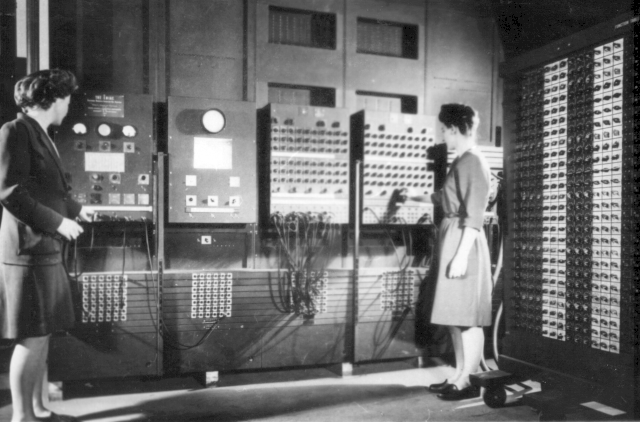This is a simulator for the ENIAC, the first electronic general-purpose computer, built in 1946.
The demo is set up to run three pre-configured programs. Select one and then follow the directions for running the machine. (Read below for how to write your own programs!)
You can view it at http://eniac-simulator.herokuapp.com/.
Or, fire up the ENIAC locally by performing these operations:
- Run
foreman start - Visit http://localhost:5000/
An ENIAC "program" consists of the wiring together of different units, and the units' settings (dials, knobs, etc). Let's say you wanted to write a program that simply lets the user enter two numbers, and then it would add them to produce a sum. Here's how you could wire up and configure the ENIAC do accompliash that:
- Let the user load X into the top row of the Constant Transmitter
- Let the user load Y into the bottom row of the Constant Transmitter
- Set the initializer unit to kick off these operations (over control line 0) when the ENIAC is started:
- Constant Transmitter sends top number (over digit tray 0)
- Accumulator 0 receives number (over digit tray 0)
- Kick off the next operations over control line 1
- The next operations:
- Constant Transmitter sends top number (over digit tray 0)
- Accumulator 1 receives number (over digit tray 0)
- Kick off the next operations over control line 2
- The next operations:
- Accumulator 0 transmits contents (over digit tray 1)
- Accumulator 1 receives number, adding to its contents (over digit tray 1)
At the completion of this program, Accumulator 1 holds X+Y.
Even this simple program takes about 50-100 lines of configuring and wiring up: https://github.com/jimlindstrom/eniac-simulator/blob/master/public/test_programs/test_add_two_constants_once.js
To see more complex programs, browse these tests: https://github.com/jimlindstrom/eniac-simulator/tree/master/public/test_programs
I've focused on building enough to get a flavor for what it was like to program the ENIAC. What's included in this simulator so far is:
- Initiating Unit
- Cycling Unit
- Master Programmer
- Constant Transmitter (1)
- Accumulator (2)
- Buses
Not yet tackled are:
- Multiplier
- Function Table
- Divider and Square Rooter
- Printer
- Card Reader
(Refer to TODO.txt for a development roadmap.)
